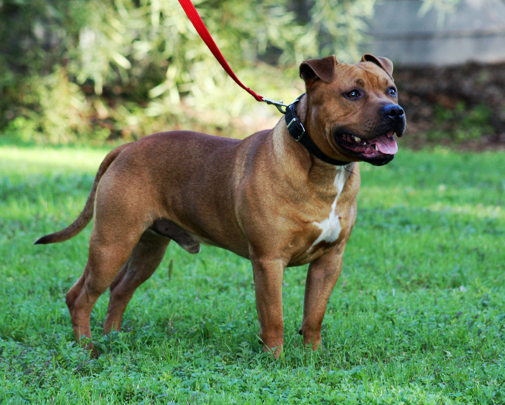Dog Aggression in a Breeding Program
Should you breed from a dog that is dog-aggressive?

“Deez” was surrendered into rescue having almost-exclusively lived in a backyard for 2 years, with minimal interaction with other dogs. Despite this lack of socialisation, he was friendly with other dogs. While his breeder wasn’t what would be regarded as highly ethical, they obviously were producing dogs with good temperaments. His sociability with other dogs was the reason we were able to so easily place him into a new home – he now has another dog for company.
There’s four questions concerning that particular dog’s aggression that I would consider when elevating a dog’s suitability for a breeding program.
Firstly, if the dog is biting/attacking other dogs, is it illustrating bite inhibition by not actually doing damage to other dogs? If a dog is ‘attacking’ at a lot of dogs, but never doing damage, then this is a good sign that the dog is not intending to physically harm other dogs.
Then, how common is this type of aggression in this breed? Very common, uncommon, rare? In some breeds, all you can do is pick ‘the best of a bad bunch’. Complimentary temperaments in proposed matings are important, too (you wouldn’t put a ‘bad dog’ to another ‘bad dog’, for conformation or temperament).
Is the dog so aggressive to other dogs that you can’t achieve a natural mating? If the dog is not psychologically sound enough to have sex then it shouldn’t be bred from. Consider that many solitary species, like tigers, bears, rhinos, are generally territorial and aggressive to one another – yet, they still able to reproduce naturally. That is, the instincts associated with reproduction are strong enough to override a natural dislike to their own kind. Dogs, who are naturally social animals, should at the very least have a temperament conductive to natural matings.
Finally, a question to ask yourself as a breeder: Would you be satisfied if your puppy buyers ended up with a dog of similar temperament? That is, would you be proud to produce a dog with similar dog-aggression? Are you puppy buyers able to manage or train against dog-aggression? Dog owners want dogs to be ‘friendly’, and producing dogs with dog-aggression are likely to fall short of the owners’ expectations.
What do you think? Should a dog that has dog aggression be bred from? Under what circumstances?

